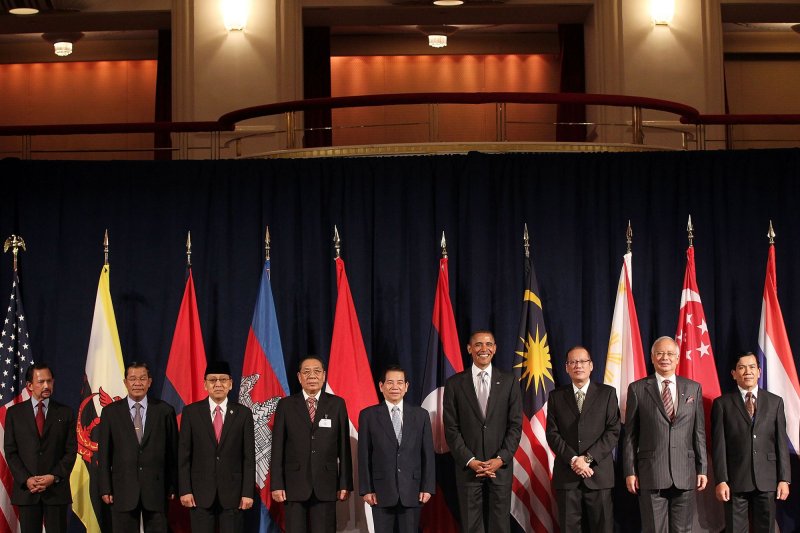U.S. President Barack Obama (forth from R) attends a working luncheon with ASEAN leaders September 24, 2010, in New York City. Representatives from 10 of the ASEAN member states met with Obama Monday and Tuesday to discuss trade and the South China Sea conflict, among other topics. File Photo by Spencer Platt/UPI |
License Photo
RANCHO MIRAGE , Calif., Feb. 16 (UPI) -- Hundreds of demonstrators protesting human rights abuses greeted President Barack Obama and leaders from 10 Southeast Asian nations as they opened a two-day conference in Rancho Mirage, Calif.
The protesters gathered in the desert heat as Obama convened with 10 other leaders from Brunei, Cambodia, Indonesia, Laos, Malaysia, the Philippines, Singapore, Thailand, Vietnam and Myanmar. It is the first time representatives of ASEAN -- Association of Southeast Nations -- have assembled in the United States. Monday began a two-day summit scheduled to focus on economic development, security and the Trans-Pacific Partnership.
The protests largely concerned human rights violations in participating countries, several of which are considered dictatorships. A number of demonstrators were naturalized Americans who formerly lived in Southeast Asia. A group called for the end of Cambodian Prime Minister Hun Sen's 30-year domination of government.
"We are here today to send a clear message to Hun Sen that we don't support communists, we don't support a dictator, we don't support a tyrant. Hun Sen must go," Bona Chhith of the Cambodian American Alliance told the Voice of America.
Thailand's 2014 coup, and the inclusion of Thai Prime Minister Prayut Can-o-cha, a former army general, also drew protests.
"He shouldn't come to free land as the United States. The dictator should not stay in this free country," Thai-American Chao Suethae commented.
Toy Pipoppinyo, another protester, said as a student in Thailand, he witnessed a classmate be pulled into a truck and beaten with a bag over his face for criticizing the government.
National Security Advisor Susan Rice said "some of our ASEAN partners have a long way to go on human rights, but the U.S. will continue, as we do everywhere, to stand up for the rights of all people."
She added that Obama would promote the rule of law and "capable, accountable institutions" {link:at the summit.
: "http://www.usatoday.com/story/news/nation-now/2016/02/15/asean-summit-obama-calls-mutual-prosperity/80434742/" target="_blank"}
"Here at this summit," Obama said Monday, "we can advance our shared vision of a regional order where international rules and norms, including freedom of navigation, are upheld, and where disputes are resolved through peaceful legal means."
Maritime disputes between China and Southeast Asian countries, notably control of the South China Sea, has been a contentious issue planned to be discussed at the meetings. Obama called for negotiation of disputes in the region, where China is constructing artificial islands and the navies of China and Vietnam have engaged in aggression toward one another.
Also on the table for discussion is the Trans-Pacific Partnership, a multinational free-trade deal signed last month by the United States and four ASEAN members. The partnership is meant to blunt Chinese economic influence in Southeast Asia and reduce economic barriers, but provides restrictive copyright regulations and expands the rights of corporations to sue governments. Some regard the deal as counterproductive to U.S. interests.
Amid a sea of protesters' flags and languages, a small group demonstrated against the TPP, including Jose Godinez of the United Steelworkers.
"We are for trade, but trade has to be fair. And the TPP is not fair," Godinez said.
Those at the summit also were expected to discuss entrepreneurship, maritime security, terrorism, human trafficking and climate change.















